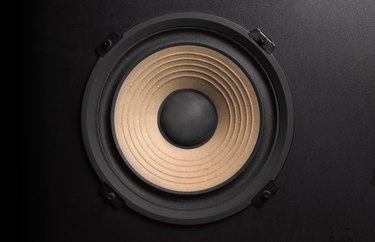
No matter what kind of music you listen to, hearing it with a side dish of crackle and buzz is irritating. Static in speakers isn't just an irritation; those sudden bursts of random noise can damage your speakers by pushing them past their design limits. There are plenty of potential culprits, but investing some time in basic troubleshooting can usually clear up the problem.
Static in Speakers With a Connector
Video of the Day
If your speaker wires have a connector built in, such as the headphone plug on computer speakers or the RCA plugs you find on some stereo speakers, the connector itself is a potential trouble spot. To test it, gently wiggle and rotate the wire while you are playing audio. If you hear a burst of static when you wiggle the wires, you've located the problem. If the wires aren't permanently attached to the speakers, replace them with a new set. If the wires are permanent, you'll need to cut off the faulty connector and attach a new one. They're not hard to find, and you can choose either soldered or solderless types depending on your level of handiness.
Video of the Day
Speakers With No Connector
A bad connection is often the cause of speaker noise, even if there's no actual connector. To test for this wiggle the wires again or disconnect the wires one end at a time and inspect them. Look for bared wires that are frayed or that are thinner than they should be because several strands have broken off. If necessary, cut off the ends cleanly and re-strip them. You can even "tin" them with a small amount of solder, which joins the strands into a single piece that is easier to attach firmly. Sometimes corrosion in the wire causes the sound quality problems, and stripping new ends makes that go away as well.
Car Speakers
The speakers inside your car's dash and doors are usually either soldered to the speaker wires or use what's called a "spade" connector. If they're soldered, you can gently reheat the solder joint with a pencil-type iron. If the solder joint has cracked or loosened or if it was done poorly in the first place, this can fix the problem. If you have spade connectors, the wiggle test is one way to check. Your other option is to cut the old connectors from the wire and crimp or solder new ones to the wire.
Check the Cones
If your speaker is buzzing, sometimes it's not static as such but physical damage to the speaker. Most speakers use a cone powered by a strong magnet to create sound, and those cones wear out over time. Remove the cover from the speaker or the speaker from its enclosure if necessary and take a look at it. If the cone has a puncture or tear or if the flexible ring that lets the cone vibrate is falling apart, the sound suffers. Usually, it's simplest to replace an individual speaker with one that's similar, but you may also opt to have your speakers re-coned by an audio technician.
Ground Loop Problems
Sometimes the static in your speakers isn't static at all, but an electrical grounding problem. The so-called "ground loop hum" or "60-cycle hum" happens when the components aren't properly grounded. In a car stereo, you may need to use a shorter or heavier ground wire. If that doesn't fix the problem, you may have a bad connector on one of the patch cords that connects the components. Get a new patch cord and test it in place of the existing ones, one at a time. In a home audio system, connecting all the components through the same power bar usually does the trick. If it doesn't, check the patch cords one at a time in search of one with a faulty connector.
Digging Deeper
If none of these standard troubleshooting methods fix the problem, you have to dig a little deeper. One potential issue is electrical interference in the power lines, which can come from refrigerators, furnace motors or any other appliance with an electric motor. You can usually fix this by getting a power bar with power filtration built in or by picking up a separate power line filter and plugging your power bar into it.
There's also the possibility the speaker noise comes from radio signals picked up by unshielded speaker wires or the speaker itself. Try to relocate the speakers and wires away from wireless devices, but that's increasingly difficult. The other option is to use shielded speakers or shielded speaker cables in problem areas. Shielded cables are made from coaxial wire instead of the usual two side-by-side wires, so the signal wire is protected by its surrounding braided shield. They are costlier and harder to hide behind furniture, but they're worth it if they get rid of your sound problems.